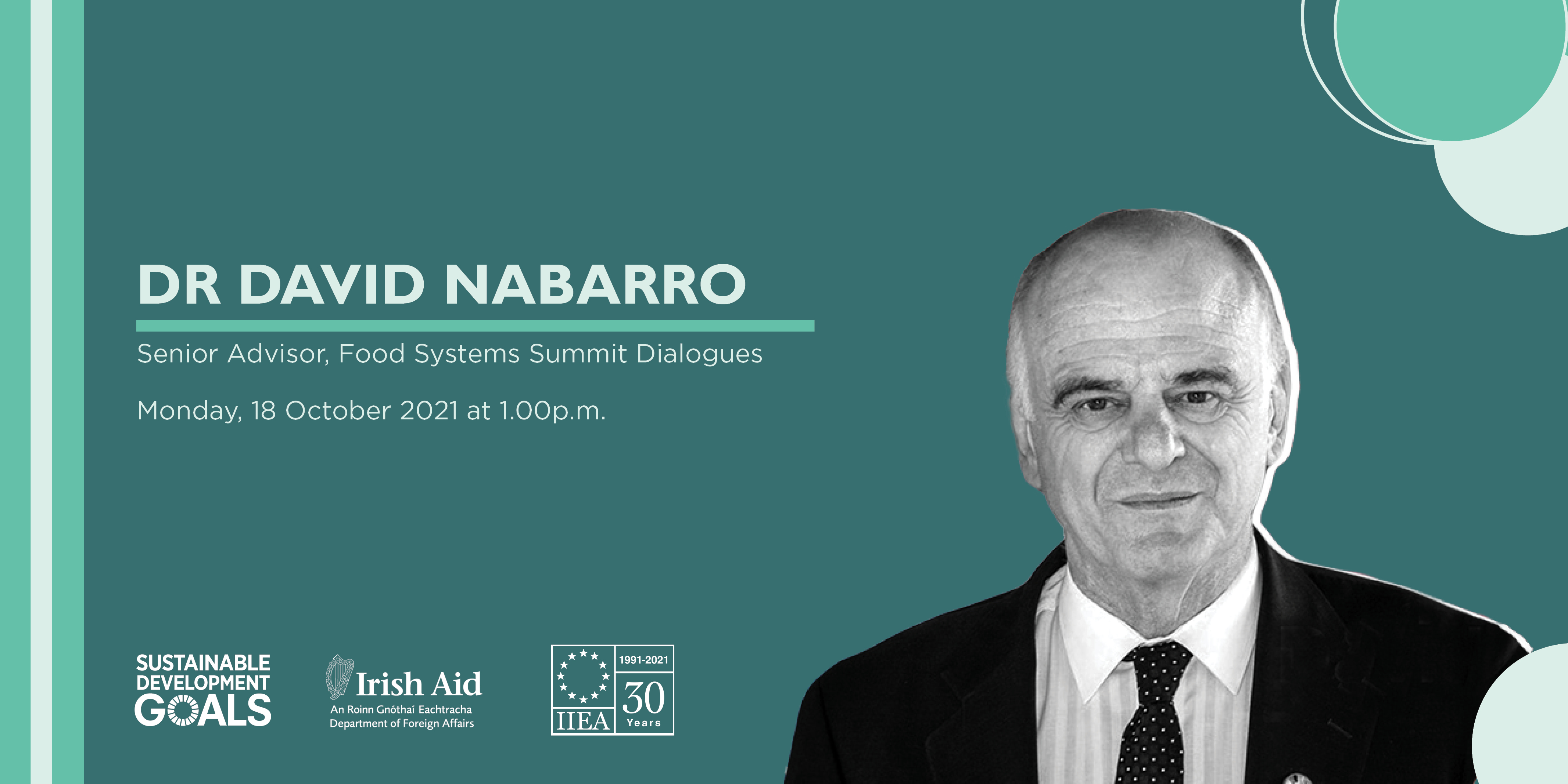Delivering on the Outcomes of the UN Food Systems Summit

Author: Stephen Frain
Introduction
In the sixth webinar of the Development Matters lecture series, which is supported by Irish Aid, the IIEA welcomed Dr David Nabarro, Senior Advisor for the UN Food Systems Summit Dialogues, to deliver an address on the outcomes of the recent UN Food Systems Summit. The UN Food Systems Summit was a first-of-its-kind, multi-stakeholder summit aimed at promoting food systems thinking and sustainable food systems. According to the UN, food systems thinking conceptualises the food system in its totality by taking into consideration “all the elements, their relationships and related effects”.
Sinéad McPhillips, Assistant Secretary at the Department of Agriculture, Food and the Marine and Ireland’s National Dialogue Convenor for the Summit, delivered introductory remarks. In these remarks, she reflected on the role the Dialogues played in establishing Ireland’s close engagement with the Summit. She expressed her hope that Ireland would play a meaningful role in delivering upon what was agreed at the Summit in New York.
An Historic Summit
The UN Food Systems Summit was branded as a “people’s summit” and brought together key farming, science, business, healthcare, academic, indigenous, youth, consumer as well as political stakeholders. Dr Nabarro described the event as a radical shift in how the UN operates. This, he argued, was pivotal to creating a solutions-oriented atmosphere in advance of the Summit and that it would not have been possible to get governments to make as many commitments as they did without it.
Dr Nabarro also attributed the solutions-oriented nature of the Summit to the important work done at the near 1300 Summit Dialogues. These dialogues were organised by independent, national and international authorities as a means of identifying the key issues to be discussed at the Summit as well as identifying potential “game-changing” solutions in advance. Dr Nabarro made the case for dialogue format to be continued beyond the Summit in order to deliver on its outcomes.
Irish Leadership
Food Vision 2030, Ireland’s new agri-food strategy, is one of the first strategies of its kind globally to adopt such an approach to agri-food policies. Given the fact that there currently is no agreed-upon international framework for sustainable food systems, Ireland hoped to position itself as a leader when it comes to delivering on the outcomes of the Summit. Dr Nabarro said that Ireland has played, and hopes that it will continue to play, a profound a far-sighted leadership role in agriculture, food, nutrition and poverty reduction. In addition to Ireland’s agri-food strategy, Ireland international development strategy, A Better World, calls for sustainable food systems which take a holistic account of economic, environmental and social sustainability.
Towards a Progressive Transformation of Food Systems
Dr Nabarro reiterated UN Secretary-General Guterres’ call for a second summit within the next two years. He said this will be important as a means of taking stock of progress made toward food systems transformation as well as monitoring the implementation of commitments made at the original Summit. Dr Nabarro emphasised the importance of ensuring that a multi-stakeholder approach is maintained throughout. Multi-stakeholder engagement, he argued, will be key to an effective coordination of implementation of coordination strategies and review of progress made.
Dialogues
Dr Nabarro stressed the importance of dialogues beyond the Summit when it comes to achieving sustainable food systems. Given the fact that there are so many stakeholders with varying interests at play, there will inevitability be differences of opinion. The Summit has not reconciled all of these differences and dialogue is necessary to keep discussions alive. “This is only the beginning”, he added.
The Sustainable Development Goals at Stake
With only thirteen harvests left until 2030, achieving the outcomes of the UN Food Systems will be a critical milestone on the journey to achieving the UN Sustainable Development Goals during the “Decade of Action”. Given the interconnected nature of sustainable food systems and the commitments made during the Summit by countries, the outcomes of the Summit will have knock-on implications for all of the Sustainable Development Goals. Considering the fact that sustainability in food systems covers topics as broad as economic, environmental and social sustainability, Dr Nabarro stated that should there be no change in food systems, it pose a major impediment to the sustainable development agenda.
What this Means for Ireland
Ireland sought to assume a leadership position at this Summit through the promotion of a 'food systems approach' to agri-food policy. More specifically, it did in the context of Action Track 1 (Ensure access to safe and nutritious food for all) by providing input, based on its Food Vision 2030 strategy, as well as its international development expertise in eradicating hunger. President Michael D. Higgins highlighted Ireland’s longstanding efforts to end world hunger in his address to the Summit. He also noted how, going forward, Ireland, is leading the development of a Food Systems Transformation Support Facility that will provide structured support to countries to build their own capacity to develop and implement their national pathways. In this capacity, Ireland will be able to draw upon its expertise whilst contributing to creating the accountability measures needed to deliver upon the outcomes of the Summit.
Conclusion
The Summit was a ground-breaking moment for food systems and how the international community approaches sustainable development more generally. But as radical a change as the Summit might be for how the UN operates, much needs to be done to ensure the promises of the Summit are kept. Ireland, for its part, played a leading role at the Summit and aspires to continue to do so in the implementation of the Summit’s outcomes through the Food Systems Transformation Support Facility. In the words of Dr Nabarro, this is just the beginning of a marathon.
